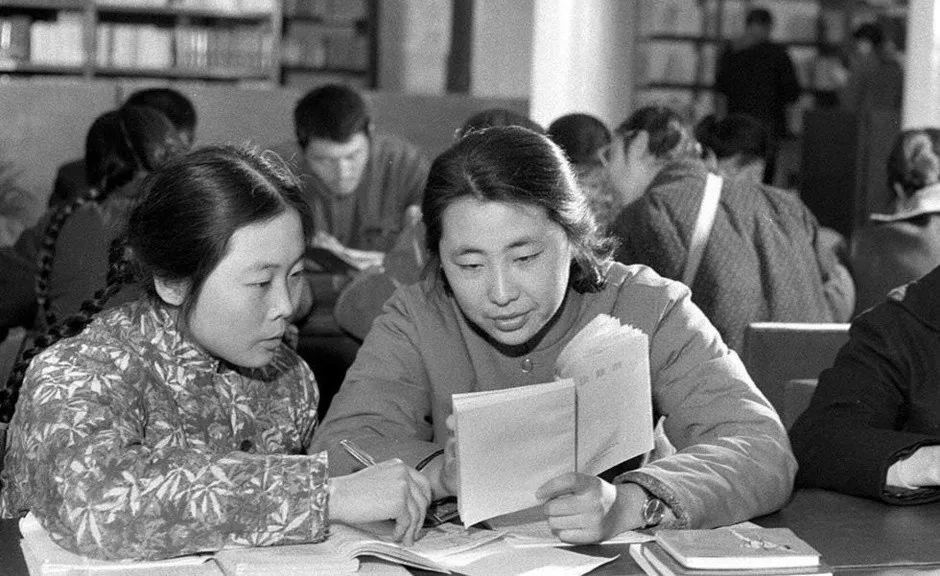Text▕ JIA Lei
At the end of March 1978, in freezing Beijing, wild geese did not return, trees were still short of new sprouts, and some brave children occasionally appeared in the skating rink of Houhai. Few people realized that a different spring was coming.
As the National Science Conference was drawing to a close, GUO Moruo, President of the Chinese Academy of Sciences, wrote an article as the closing speech, of which the most famous remark was:
"The most brilliant spring of science in our nation's history has arrived."
This remark and this moment have been engraved in time and later generations call it "the Spring of Science."
Looking back on that history, we can also recognize it as "the Spring of Education."
01
No nation in the world is as enthusiastic about education and being intellectual as Chinese people. China's education process was interrupted by a decade of cultural revolution and this enthusiasm had been suppressed for ten years as well.
However, it could not be suppressed anymore.
In 1977, the college entrance examination system was restored, with 5.7 million people flocking to the examination places, hoping to change their fate with education. The young man who put down his hoe and picked up the pen again was often troubled by a simple math problem. Nevertheless, 300,000 people were admitted to universities.
When "the Spring of Science" finally came in 1978, the enthusiasm of Chinese people for education shocked the whole world.
"Knowledge of mathematics, physics and chemistry affords you to face the world with no fear." This is an "aphorism" that has been passed down and circulated for many years since then.

The ideal of "building four modernizations" and the desire for better life made Chinese people rest hope on science and technology for a long time. High school graduates today may find it hard to imagine that mathematics was once the major with the highest admission score in science for many years— the model power of CHEN Jingrun contributed a lot.
Around the year of 1985, China's reform and opening up process entered into a new stage. The pace of industrialization gradually accelerated and brought about specialization of labor. The influences of western modern management system expedited further the demand for professional talents in China.
Universities began to subdivide disciplines, with some formerly secondary disciplines becoming independent ones and new disciplines setting up constantly. For the first time, management, auditing, marketing, and advertising appeared on a large scale in the Chinese education system.
The trend of subdivision of disciplines is a response to social demands and this trend has continued even after 1990. In 1990s, there was a great demand for "technical and professional talents" in enterprises. The income of technical experts was often higher than that of university professors and so was their social status.
However, there is another trend at the same time that is becoming more and more obvious and "interdisciplinary talents" are about to display their potentials.
In 1993, foreign enterprises began to enter China on a large scale.
"This year, P&G established four companies and five factories in China at one go; Anheuser-Busch, the world's largest beer manufacturer, purchased 5% of the shares of Tsingtao Beer with 16.4 million RMB; and the first car produced by General Motors in China finally came off the production line."
According to WU Xiaobo, a financial writer, it was also from this year that foreign languages had gradually become a necessity. A worker who knew a foreign language would soon stand out and be poached by foreign enterprises with high salary. Interdisciplinary talents began to show their capabilities.
Entrepreneurs raised in this period were all interdisciplinary talents with technical background. They were bold in personality, learned sales from business battlefield, and self-taught management.
02
The first two decades of the 21st century is coming to an end. In the past 20 years, China has been stepping out to the world, the industrial structure has changed, and the revolution of information technology and network has swept the whole country and constantly impacted the traditional employment mode. After university enrollment expansion, the employment problem has become increasingly serious.
A lot of things have changed.
After the year of 2000, college students often put "employment" in the first place on their priority list and bury ideals in the bottom of their hearts. As the division of labor in Chinese enterprises has become more detailed than ever, employers hope to spot those exactly match the job positions in order to reduce the cost of recruitment.
Under the pressure of industrial labor division system and graduate employment evaluation standard, the university education deviates a little.
"Developing professional education" to seize market opportunities has become a reluctant choice for some universities.
We have witnessed the rise and fall of many disciplines, among which civil engineering in the boom of real estate, health science before doctor-patient tension becomes apparent and journalism before the popularization of WeMedia are some typical examples.
Wind blows and stops at times. 20 years later, people finally realized that education should return to its original purpose.
According to the underlying logic of social operation, there is such a virtuous circle: cultivating talents with standards in accordance with social demands can in turn promote social progress.
What is the general development trend of China in the next 20 years? By answering this question, the education industry can easily find its way.

In the next 20 years, China will continue to integrate into globalization as a leader rather than a pursuer. The power of commercial civilization will become obvious and penetrate into all walks of life in China. The speed of the new round of technological revolution goes beyond the imagination, resulting in quick shifts of professions, making education for market opportunities a gamble with a slim chance of winning.
We can draw a simple conclusion through deduction:
In the future, high-level management talents in China are "all-round" talents, understanding business, having leadership ability, and knowing technology and humanities.
Well, where do they come from?
03
Zhejiang Province is quite special among all provinces in China.
Since ancient times, Zhejiang is a mountainous area and has few arable lands, whereas the commercial civilization is highly developed here. Benefitting from China’s reform and opening up, Zhejiang has become the most entrepreneurial land with high spirit of reform. In the new century, emerging industries represented by Alibaba grow up from the land and develop rapidly along Qiantang River.
Zhejiang University naturally becomes the disseminator and inheritor of these good genes.
Zhejiang University’s business and economics subject ranked the 53rd in the 2020 world university rankings by Times Higher Education. Zhejiang University’s School of Management has cooperated with first-class enterprises to create one business miracle after another via an integration of management theory and practice. In addition, Zhejiang University has always been in the forefront of reform, which makes it a leading university in China in this regard.
For example, the establishment of the “Business Plus” talent cultivation system is the reform and development model determined by the School of Management of Zhejiang University in alignment with its vision of “to be a world leading management school rooted in China”, while taking into consideration the development trend of the next 20 years. After making the determination, the School put it into action in a quick manner.

In September, 2017, the School of Management of Zhejiang University started the reform in its undergraduate programs, indicating an official launch of the “Business Plus” system.
This is a business education reform that other Chinese universities rarely dare to try. Since the reform and opening up 40 years ago, business education in China has generally adopted the mode of “Following”, following the theories and ideas elicited from modern western management system, following the curriculum of Harvard Business School, MIT and other universities in the United States, and employing faculty members with overseas education experience.
The School of Management of Zhejiang University carries on the reform with braveness and resolution. The reform is multi-faceted involving faculty, academic disciplines, curriculum, and a series of innovative practices. Resources have been reallocated to ensure accurate and effective implementation. Following the logic of “Business + Technology + Humanities”, the School integrated management fundamentals, scientific and technological insight and humanistic spirit in its reform of undergraduate programs. In August, 2018, the formerly eight specializations were successfully upgraded and optimized into three programs, namely Business Administration, Accounting, and Information Management and Information System. Such a brave reform has also brought great pressure to the School.
However, WEI Jiang, Dean of the School of Management of Zhejiang University, believes that a world leading management school should be a surpasser and leader rather than a pursuer.
In the view of this reformer full of idealism, business education and business environment reflect each other. In the past, Chinese business learned from and followed the West, but now surpassers such as Alibaba, Tencent and Huawei have already born.
Of course, the newly launched undergraduate education reform is just one part of “Business Plus”. This talent cultivation ecosystem covers many aspects, aiming at cultivating first-class leaders or management scientists based on the demands of Chinese society in the next 20 years.
04
Who are management scientists? Management scientists are those achieving mastery through acquiring knowledge and skills of different subjects and developing in an all-round way. In the viewpoint of WEI Jiang, today’s universities have little advantage over enterprises in terms of cultivating “professional and technical talents.”
“The laboratories of many enterprises have excellent experts who can well match university professors in knowledge and skills. The training system of many enterprises is even more practical than university curriculum,” WEI Jiang said. “Zhejiang University should not take graduate employment as the goal and cultivate professional talents. Instead, we shall cultivate talents with integrity and perseverance, capable of taking on responsibilities managing complex situations, and steering the destiny of the country, as proposed by the University’s former president Chu Kochen."

Chu Kochen, President, Zhejiang University (1936-1949)
According to the philosophy of “Business Plus”, ZJU-SOM has reduced the proportion of “specializations” and conducted a comprehensive reform in cultivating students in undergraduate, professional master and practice-oriented doctoral programs.
In this brand-new talent cultivation ecosystem, boundaries among specializations, academic disciplines and even colleges are opened. Management is connected with engineering, liberal arts, science, social sciences and other disciplines. For example, in MBA Health Management track, there are not only management faculty, but also experts and scholars in healthcare and entrepreneurs. In MBA New Finance track, fin-tech has been integrated with finance.
In the EMBA program which targets at senior managers and entrepreneurs, an integrated training scheme SMART has been developed, opening up the boundaries among science, management, art, social responsibility and technology. A series of innovative “Business Plus” courses have been launched, such as The Spirit of Zhejiang Entrepreneurs and Management Philosophy in “Business + Humanities” module, “Business + Technology” courses in the form of dialogues with academicians, and “Business + Engineering Technology” courses focusing on national advanced manufacturing.
The practice-oriented Doctor of Business Administration Program takes “Business Wisdom” as the core of its curriculum and integrates science, technology, economy and philosophy.
In the “Business Plus” system, students are accessible to professional courses of other disciplines in addition to management. For instance, the interdisciplinary program of “Management + Statistics” has been developed with the support from the University’s Chu Kochen Honors College, and the “Intelligent Finance” program is another innovative practice of “Business Plus” that integrates finance, mathematics and computer.
“Business Plus” vitalizes high-quality resources of the whole school and even the whole university, and the purpose of such a brave reform is to cultivate talents mostly needed by Chinese society in the next 20 years.
“This is Zhejiang University, one of the best universities in China and also the most innovative one. Students here are outstanding and should become leaders to change the world,” WEI Jiang said. "If a person is confined by the professional boundary, he will be narrow-minded; whereas when standing on the top of Mount Tai, he will see things in a big picture."
The purpose of “Business Plus” is to cultivate innovative interdisciplinary management talents who are able to think in big-picture terms, develop leadership capability and humanistic spirit, and are committed to tackle real-world problems.
The industrial age has gone and a new era is coming. In the next 20 years, China will also change from a pursuer to a surpasser. Only all-round talents can confidently speak out:
“From whichever direction the wind leaps, I remain firm.”